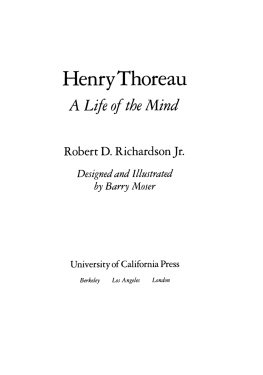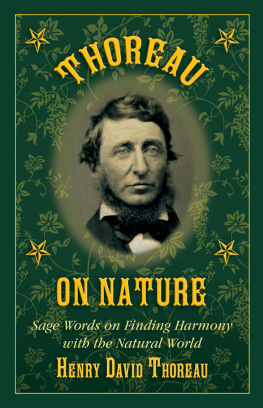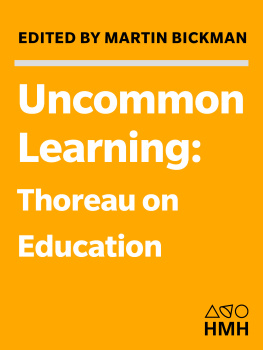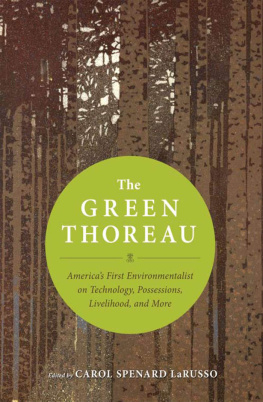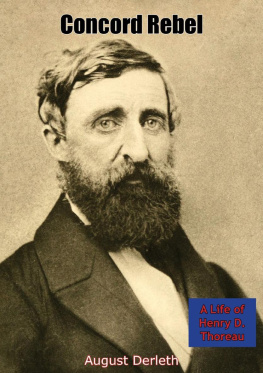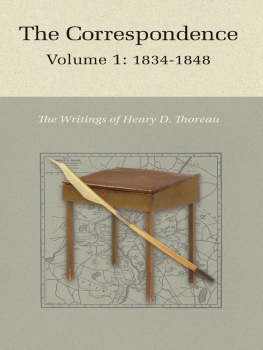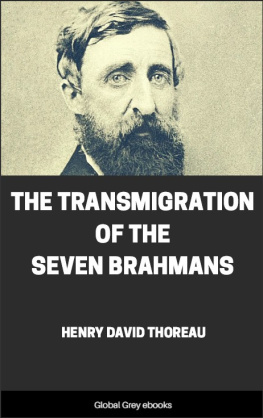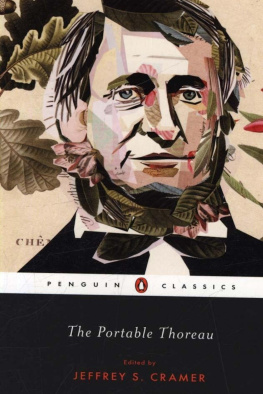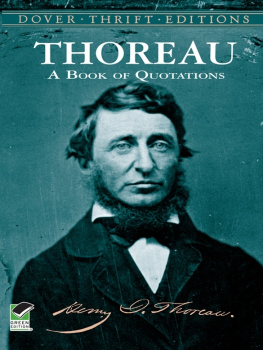Moser Barry - Henry Thoreau: a life of the mind
Here you can read online Moser Barry - Henry Thoreau: a life of the mind full text of the book (entire story) in english for free. Download pdf and epub, get meaning, cover and reviews about this ebook. City: Berkeley, year: 2015, publisher: University of California Press, genre: Non-fiction. Description of the work, (preface) as well as reviews are available. Best literature library LitArk.com created for fans of good reading and offers a wide selection of genres:
Romance novel
Science fiction
Adventure
Detective
Science
History
Home and family
Prose
Art
Politics
Computer
Non-fiction
Religion
Business
Children
Humor
Choose a favorite category and find really read worthwhile books. Enjoy immersion in the world of imagination, feel the emotions of the characters or learn something new for yourself, make an fascinating discovery.
- Book:Henry Thoreau: a life of the mind
- Author:
- Publisher:University of California Press
- Genre:
- Year:2015
- City:Berkeley
- Rating:4 / 5
- Favourites:Add to favourites
- Your mark:
- 80
- 1
- 2
- 3
- 4
- 5
Henry Thoreau: a life of the mind: summary, description and annotation
We offer to read an annotation, description, summary or preface (depends on what the author of the book "Henry Thoreau: a life of the mind" wrote himself). If you haven't found the necessary information about the book — write in the comments, we will try to find it.
Henry Thoreau: a life of the mind — read online for free the complete book (whole text) full work
Below is the text of the book, divided by pages. System saving the place of the last page read, allows you to conveniently read the book "Henry Thoreau: a life of the mind" online for free, without having to search again every time where you left off. Put a bookmark, and you can go to the page where you finished reading at any time.
Font size:
Interval:
Bookmark:

A Life of the Mind
by Barry Moser
University of California Press
Berkeley Los Angeles London
University of California Press
Berkeley and Los Angeles, California
University of California Press, Ltd.
London, England
Copyright 1986 by
The Regents of the University of California
LIBRARY OF CONGRESS CATALOGING-IN-PUBLICATION DATA
Richardson, Robert D. Jr. 1934
Henry Thoreau: A Life of the Mind.
Includes index.
1. Thoreau, Henry David, 18171862. 2. Authors, American19thcenturyBiography. I. Title.
PS3053.R53 1986 818'.309 [B] 8228845
ISBN 978-0-520-06346-4 (pbk. : alk. paper)
e-ISBN 978-0-520-90885-7
This book is dedicated to
W. J. BATE
who teaches that in and through the personalrediscovery of the great, we find that we need not bethe passive victims of what we deterministically callcircumstances.... But that by linkingourselves... with the great we can become freerfreer to beourselves, to be what we most want and value.
The Burden of the Past
This is an intellectual biography of Henry Thoreau from 1837, whenhe was twenty and finishing college, to his death in 1862. My mainpurpose has been to give an account of the development of Thoreau asa writer, a naturalist, and a reader. This has necessitated treating hislife as a whole, and setting it in those public contexts which exist forevery life, no matter how private. It is always remembered of Thoreauthat he required a daily walk of at least four hours sauntering throughthe woods and over the hills and fields, absolutely free from all worldlyengagements. It is not always recalled that he spent at least that muchtime every day at his desk, reading and writing. Emerson said it bestwhen he summed up Thoreaus education, and, thinking of the usualacademic degree, conferred instead on his best friend that of thebachelor of thought and nature.
There is a long-standing tradition of generosity and helpfulnessamong modern Thoreauvians that makes it a pleasure to acknowledgehere a few of the many obligations I have incurred during thepreparation of this volume. Anne McGrath, Malcolm Ferguson, TomBlanding, and the others at the Thoreau Lyceum in Concord havehelped with questions and materials, especially those relating to EllenSewall. Marcia Moss of the Concord Free Public Library has alwaysbeen enthusiastic and helpful with all kinds of archival matters.Martin Ridge and the exemplary research staff of the Henry E.Huntington Library in San Marino made the research for the last part of thisbook go very quickly and pleasantly. I have also benefitted from thehelpful cooperation of librarians at the Pierpont Morgan Library, theBerg Collection at the New York Public Library, the Boston PublicLibrary, the Houghton Library at Harvard, and the Special Collectionslibrary at the University of Denver.
Evelyn Barish, Raymond Borst, John W. Clarkson Jr., BradleyDean, Dana McLean Greeley, Robert Gross, Michael Meyer,Rosemary Mitten, Joseph J. Moldenhauer, Donald Mortland, JoelMyerson, Margaret Neussendorfer, Joel Porte, Barton L. St. Armand,Richard Schnieder, Gayle L. Smith, and Kevin P. Van Anglen allprovided information, assistance, or inspiration, and sometimes all three.
Robert Sattelmeyer made available to me the invaluable results ofhis study of Thoreaus reading. Stuart James read an early draft andshowed me many ways to make it better. Victor Castellani helped withLatin, John Livingston with ideas of history. Judy Parham created avast card index to Thoreaus reading that was indispensable. CarolynMartin and Bradford Morgan gave me new insights into A Week and The Maine Woods . Beth Witherell and her staff at the Thoreau Editionin Santa Barbara went far out of their way to provide endless copies ofmaterials that are gradually being published in the handsome newPrinceton volumes.
Walter Harding, dean of Thoreau scholars, has been wonderfullygenerous with information and encouragement to me, as to so manyothers who share his faithfulness to the Man of Concord. This bookcould not have been written without his leading the way. Philip Gurahas helped in many ways. He first suggested that the book shouldextend all the way to Thoreaus death. I have traveled widely in Denverfor many years now with Burton Feldman as co-adventurer in ideas,and it was he who persuaded me that one should reach for the generalreader as well as the specialist. Allen Mandelbaum has encouraged andaided me, and improved the manuscript itself, in many and variedways, and from start to finish. He believed in the project all along,and he communicated his enthusiasm to Stanley Holwitz and to thesplendid editorial and production people at the University ofCalifornia Press. I am delightedand very flatteredthat this book willhave a place in the distinguished and compelling oeuvre of Barry Moser.A very great, long-standing, and ultimately unpayable debt is feeblyacknowledged in the dedication.
This book is also for my daughters and my wife. It is for Lissa,whose cheerful and enterprising individualism confirmed for me thatSt. Henry can be the patron of women as well as men; for Anne, whosepassion for commitment and relationship pushed me to attend toThoreaus social and personal sides (she also gave the manuscript asearching and helpful reading); and for Elizabeth, who has been, throughthick and thin, the toughest critic, the closest companion,and the most important colleague of all.
To live within limits, to want one thing, or a very few things, verymuch and love them dearly, cling to them, survey themfrom every angle, become one with themthatis what makes the poet, the artist,the human being.
Goethe
R ETURNING TO CONCORDfrom Harvard College in the early fall of 1837,
Harvard commencement had been held on the thirtieth of August,following rather than preceding the summer vacation as was commonin those days. Within two weeks, Thoreau was not only back inConcord, living with his family in the Parkman house facing Main Street(on the site of the present Public Library) but he had a job teaching inthe Concord Public Schools. Eighteen thirty-seven was a year offinancial crisis for the United States and the start of a serious depressionthat lasted into the 1840s. Bank after bank had suspended payment,and Thoreau was lucky to have any job at all, let alone a good one. Butbefore he had held the job for two full weeks, he had thrown up theposition rather than administer the expected daily canings. A famousanecdote tells how one of the Concord school board members,
But the fall was not all disappointment. A few days before hisrunin with Ball, about the middle of September, he was out walking andsearching for
This particular autumn was of good omen for Thoreau in otherways. For this was the time when he first became really close to
It was a busy, eventful fall. There were walks and river outings,there was the active family life at home with his mother, father, andbrother, not to mention aunts and boarders. He also worked for hisfather, making pencils. After the first teaching fiasco, there was theanxious search for another job, and there was the tonic, life-changingfriendship with Emerson. He was also doing a great deal of reading,writing, and thinking during this fall. As his habits became settledin later years, he found a daily walk of several hours length a necessity.But he was from the start as much a writer as a walker, and a dailystint at his desk was always just as much a necessity to him. I seek agarret, he wrote in the inaugural entry in his new journal. He traveledConcord in his walks and river outings. He traveled everywhere elsevia books in the garret, and in between trips, he wrote out his accountsof both kinds of excursion.
Font size:
Interval:
Bookmark:
Similar books «Henry Thoreau: a life of the mind»
Look at similar books to Henry Thoreau: a life of the mind. We have selected literature similar in name and meaning in the hope of providing readers with more options to find new, interesting, not yet read works.
Discussion, reviews of the book Henry Thoreau: a life of the mind and just readers' own opinions. Leave your comments, write what you think about the work, its meaning or the main characters. Specify what exactly you liked and what you didn't like, and why you think so.

